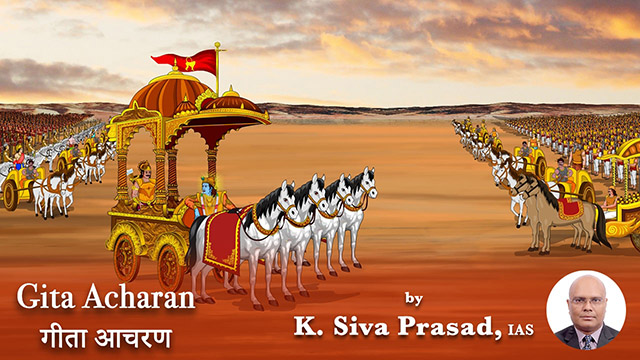
Different belief systems describe 𝙋𝙖𝙧𝙖𝙢𝙖𝙩𝙢𝙖 in different ways. Depending on our belief system, the appearance of 𝙋𝙖𝙧𝙖𝙢𝙖𝙩𝙢𝙖 changes and if HE appears in front of us in a different shape or form, it would be impossible to recognise.
Similarly, Arjun was treating Krishna like a friend for decades. He couldn't recognise that Krishna is 𝙋𝙖𝙧𝙖𝙢𝙖𝙩𝙢𝙖 till he saw HIS 𝙑𝙞𝙨𝙝𝙬𝙖𝙧𝙤𝙤𝙥𝙖𝙢. He profoundly apologises and says that "Thinking of You as my friend, I presumptuously addressed You as, 'O Krishna', 'O Yadav', 'O my dear Friend'. I was ignorant of Your majesty, showing negligence and undue affection. And if, jestfully, I treated You with disrespect or insulted you, while playing, resting, sitting, eating, when alone, or before others —for all that I crave forgiveness" (11.41-11.42).
Like Arjun, the same would happen to any of us. When we reach that eternal state of surrender, we realise that everyone around us is a part of the same 𝙋𝙖𝙧𝙖𝙢𝙖𝙩𝙢𝙖 . Every person, animal or tree would become 𝙋𝙖𝙧𝙖𝙢𝙖𝙩𝙢𝙖 , whether they are aware of it or not. Our earlier behaviour with them would look awful and the only option is to seek forgiveness like Arjun is doing. Many cultures preach and practice forgiveness, gratitude and prostration to attain this eternal state of freedom.
In the eleventh chapter of Srimad Bhagavatam, there is a long conversation between Krishna and his childhood friend 𝙐𝙙𝙝𝙖𝙫. At the end of the conversation, 𝙐𝙙𝙝𝙖𝙫 requests a very simple path toward salvation. Krishna replies that prostrate to a thief, a donkey or an enemy like you prostrate to ME. This path is very simple to understand but very tough to inculcate. This is the same as when Krishna said 'to realise all beings in the self; self in all beings and see HIM everywhere' (6.29) which can be easily achieved by dropping hatred (5.3).

